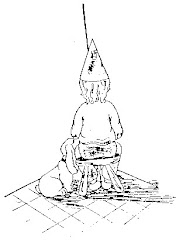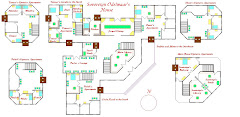I thought I would write a bit about how the Free People do various tasks. All of the civilizations (and there are thousands of them) were primitive by our standards. No one had harnessed electricity. There were no combustion engines. But some were more advanced than others.
Khirsha's family had what I consider to be an odd assortment of technology. On the one hand, they could make swords which burned with fire, and were able to drain power from another sword. Seems like advanced stuff to me. On the other hand, their 'clocks' were almost comical.
The clocks were hourglasses of varying size. The smallest lasted about a minute. The largest went as long as two hours. They were filled with water and manually operated, meaning someone had to be there to turn them when their time ran out. Clearly, this was not an efficient means of keeping time, which suggests something else that is obvious: the family wasn't overly concerned about time of day.
The family did not measure time by minutes and hours. Instead, they measured it in turns and short-turns. (When a glass's top portion emptied, it had to be 'turned'.)
A short-turn lasted roughly one minute. These glasses were used to time events of short duration. During the Presider Flamesword Test in Book I, ten small bottles were used to time each test.
A full-turn, or turn, was about an hour, or sixty short-turns. These glasses were used for meetings, classes and as part of the Village Timekeepers. The Timekeepers were made of twelve full-turns. The first four jars would contain blue tinted water. The next four would be clear. The last four would have red tinted water. Most of the villages had a Timekeeper. One of the Unaligned (a servant class people who are not especially keen on their status) would be responsible for turning the glasses.
The family had 440 houses (I counted them - and I know who lives in every one - do I live an exciting life, or what) in 29 settlements, or villages, but not all had a Timekeeper. Only the eighteen largest villages kept one, and very few houses had one. Some of the family Sovereigns, or other weathy members with live-in servants had them.
The large-turn glasses were only used at the temple during classroom instruction.
Regarding timekeeping, the family was far behind other cultures. Even the nearby Kingdom of Azua had better. But, as I said, time of day was not a significant concern to the family. They were warriors, hunters, farmers and herdsman of cattle. Most gauged their time by the position of the sun. At night, it was the moon - when there was one. Even when things were rushed, their lives were slower than ours.
Wednesday, December 17, 2008
Subscribe to:
Post Comments (Atom)
Today's Music
Yeah. That's The Great Sea all right.







No comments:
Post a Comment